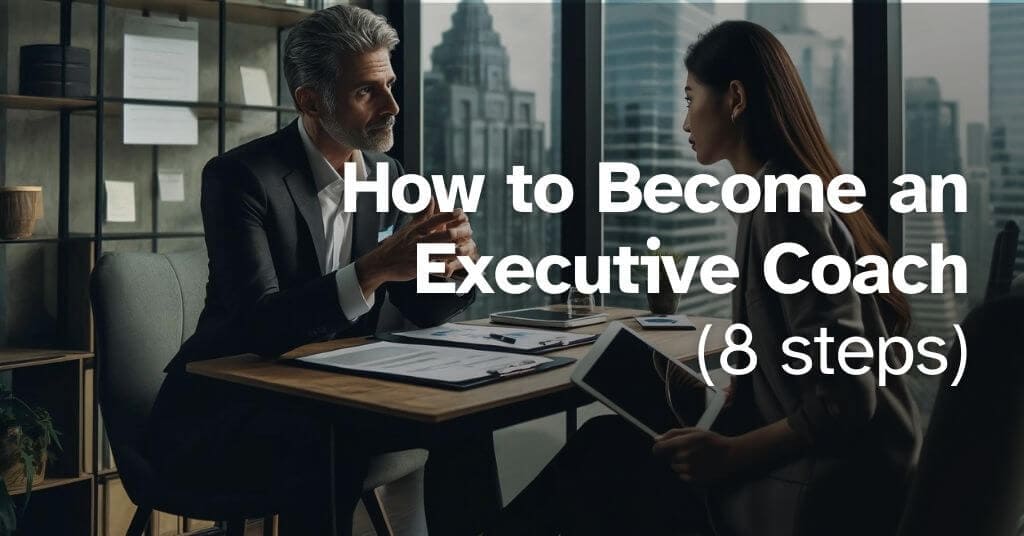Wondering how to become an executive coach? This comprehensive guide explores the 10 key steps to becoming an executive coach, from getting certified to finding clients and growing your coaching practice.
We’ll also help you choose a reputable training program and answer common questions about executive coaching.
Let’s dive in.
8 Steps to Becoming an Executive Coach
Becoming an executive coach involves a systematic approach and a commitment to personal and professional growth. Here are the key steps to consider:
1. Understand What Coaching Is (And Isn’t)
First, you need to understand what executive coaching is so you don’t invest time and effort in building a career you don’t want. Executive coaching isn’t therapy. It’s not about diving into someone’s past to solve deep-rooted issues. It’s also not consulting. You won’t tell people exactly what to do or give them all the answers.
To better understand what being a coach entails, check out some online resources. The International Coaching Federation’s (ICF) website is a great place to begin. They have loads of information on what coaching involves. Another good resource is our blog. We have plenty of guides and assessments to help you dip your toes into the world of coaching.
2. Learn to Coach
Next, you’ll need to get certified as an executive coach. Certification isn’t required to practice, but it is highly recommended. Why? Because it will teach you invaluable skills, frameworks, and techniques that will maximize your value and impact in organizations—things you won’t get from a 6-hour Udemy course…
When choosing a certification program, look for one with a strong reputation, experienced faculty, and a comprehensive curriculum tailored to executive coaching.
For instance, the iNLP Center offers excellent programs. We’re accredited by the International Coaching Federation, which means you’re getting top-notch education and training.
3. Get Experience
Start practicing the skills you learn in your coach training with friends and family, or with classmates from your coaching school. Volunteer if needed to get practice.
But don’t wait until you’re certified to start using what you learn!
You’ll need as much experience as possible to handle all the various situations and clients you’ll encounter in your career. Active listening, powerful questioning, empathy, and rapport-building are essential coaching skills you’ll learn through hands-on practice, not theory.
At the iNLP Center, we encourage students to join our peer-coaching program as early as the first week of their training.
4. Specialize
Identify your coaching niche and target market within the executive coaching specialty. Define your ideal client profile, industry focus, and areas of expertise to differentiate yourself in the competitive coaching landscape.
Finding your niche as an executive coach is key to making your mark and getting the right clients. Think about what you’re good at, the type of problems you want to solve, and for whom. Maybe you’ve got a knack for helping new managers step up to executive roles or you’re great at boosting team dynamics in startups.
When someone faces a specific issue, like leadership challenges, they’ll look for a coach who’s an expert in that, not just any coach. So specializing in a specific area will help you stand out.
Your niche will also come in handy when it’s time to market yourself. It will help you decide which social media platforms to use, what kind of content to create, and which networks to join.
5. Grow Your Network
Connect with other coaches and professionals. Join coaching associations and attend events. Networking is key in the coaching world. It helps you learn from others, get support, and find new opportunities.
Focus on building strategic partnerships and spreading the word about your services. The more people you know, the more your name gets out there. Plus, relationships with industry pros can lead to valuable partnerships and referrals.
6. Build Your Coaching Practice
Now that you’ve laid the groundwork, it’s time to get your business up and running! First, you need to register your business and get all the legal stuff sorted out. Also, consider getting liability insurance to protect yourself and your business.
Then, set up a website and social media accounts so people can find you online. You’ll also want to print some business cards for networking events and set up the software you’ll need for things like accounting, scheduling, invoicing, and video conferencing.
7. Market Yourself
Now onto finding clients. Start building an audience as early as possible—even before being certified. Publish content on platforms where your potential clients hang out. Twitter and LinkedIn are great for executive coaches, but go where your niche is.
There are tons of platforms and media to choose from—social media ads, podcast interviews, newsletter sponsorships, YouTube videos, blogging platforms (eg. Medium), forums (eg. Quora or Reddit), and many more. Choose two or three your clients frequent, learn how they work, and test them out.
8. Keep Growing and Improving
Once your practice is up and running, it’s important to keep improving. Ask for feedback from clients and other coaches to refine your methods. Constructive criticism helps you grow and become a better coach.
The field of executive coaching is always evolving, so staying updated with new techniques and trends is crucial. So continue your education with advanced courses and workshops. The iNLP Center offers lifetime access to their executive coach training, so you can pop back in at any point in your career to refresh your skills.
Also, make sure to keep up with certification requirements and renew as needed. This ensures you stay credible and maintain high standards in your coaching practice.

What Skills and Qualifications Executive Coaches Need
Coaching Competencies
Great coaches pay close attention to their clients, really getting to know their thoughts and feelings. They ask smart, thought-provoking questions that make clients think deeply and take action. With empathy and compassion, they offer non-judgmental support, building strong, trust-based relationships. Plus, they help clients set clear goals and create practical plans to achieve lasting change.
Professional Qualifications
Having certifications from well-known organizations like the ICF can really boost your credibility. Many top coaches also go for advanced degrees or extra training in areas like psychology or organizational development to improve their effectiveness with clients.
Business Acumen
You might not want to hear this. But as a coach, you’ll also need a good head for business. Knowing how to market yourself and create a strong brand to attract clients is key. Skills in networking, sales, and managing client relationships are also important for growing your coaching practice and ensuring financial success.
But rest assured, if business is not your forte, you could get a job as an executive coach and let the organization that hires you find clients for you.
Leadership and Organizational Skills
As an executive coach, you’ll need to stay up-to-date with the latest leadership trends and best practices. Understanding how organizations work, including their structures and cultures, will help you support clients in navigating complex systems and achieving their goals at work.
Growth Mindset
One of the standout traits of great executive coaches is their commitment to continuous learning and personal growth. Embracing a growth mindset and always looking for ways to improve and adapt keeps you effective and helps you constantly enhance your coaching practice.
Integrity
Finally, as a professional coach, you must stick to ethical standards, confidentiality guidelines, and professional codes of conduct set by coaching organizations like the ICF. Maintaining integrity, transparency, and respect for client autonomy in all coaching interactions is crucial.
How to Choose a Reputable Coaching Program for Executive Coaching
Choosing the right coaching program is essential for acquiring the knowledge, skills, and credentials necessary to succeed as an executive coach.
To make sure you’re choosing a good one, first check if the school is accredited by a well-known organization like the International Coach Federation. This means the program meets high standards.
Then, look at the curriculum. Make sure they offer specific courses on executive coaching. You want a program that covers all the essential topics like leadership development, organizational behavior, communication skills, and coaching competencies.
Also, research the faculty. Find out who will be teaching you and what alumni have to say about them. Having experienced and respected instructors can make a big difference in your learning.
Lastly, think about your personal preferences and circumstances. We all have our preferred ways of learning. Do you prefer studying online or in person? Does the school offer classes in your time zone? Check if they have a strong community and consider how the course material is delivered—whether it’s in video, audio, or written format.
Why Become an Executive Coach?
Becoming an executive coach offers numerous benefits and opportunities for personal and professional growth. Here are some compelling reasons why individuals choose to pursue a career in executive coaching:
Make a Meaningful Impact and Find Personal Fulfillment: As an executive coach, you get to help leaders and professionals reach their full potential. You support them in achieving their goals and making positive changes in their organizations and communities. This role lets you be part of meaningful change, bringing deep personal fulfillment and a sense of purpose. Knowing you are making a real difference in others’ lives is incredibly rewarding.
Enjoy Flexibility and Autonomy: One of the best perks of being an executive coach is the flexibility it offers. You can set your own schedule, choose the clients you want to work with and design your coaching practice to fit your values and lifestyle. This freedom allows you to work in a way that suits you best, making it easier to balance work and life.
Reap Financial Rewards: Becoming an executive coach can also be quite lucrative. Typically, you can charge higher rates for your services than you would as a life coach or other types of personal coach. You’ll have the chance to work with high-profile clients, which can boost your income significantly. Over time, this can lead to a steady, reliable income, letting you enjoy a rewarding career both personally and financially.
Grow Your Network: As an executive coach, you’ll get to work with some really interesting people. You’ll meet industry leaders and professionals who play at the top of their games. You’ll build strong, meaningful relationships with your clients, learning from their experiences and helping them grow. It’s a great way to connect with diverse individuals and expand your network.

Executive Coaching vs. Life Coaching
Main Differences
Focus: Life coaching is all about helping individuals with their personal goals, like improving relationships or finding life balance. Executive coaching, on the other hand, is centered around helping professionals improve their performance at work, develop leadership skills, and navigate organizational challenges.
Clientele: Life coaches typically work with individuals from all walks of life, whereas executive coaches mainly work with business leaders, managers, and executives.
Approach and tools: Life coaching often involves more personal development techniques and motivational strategies. Executive coaching might include more specific business-oriented tools and strategies, like leadership assessments and performance metrics.
Context: Life coaching sessions are usually more personal and relaxed, often dealing with broader life issues. Executive coaching sessions are more structured and business-focused, often taking place in a professional setting and sometimes even in the workplace.
Both life coaching and executive coaching are rewarding, so it really depends on what kind of impact you want to make and who you want to work with.
What Is the Role of an Executive Coach?
An executive coach plays a crucial role in supporting professionals, executives, and leaders in unlocking their full potential, enhancing their performance, and achieving their professional goals. Contrary to common misconceptions, an executive coach is not there to dictate solutions or tell clients what to do. Instead, they serve as a trusted partner, facilitator, and sounding board, guiding clients through a process of self-discovery, reflection, and action.
The nature of executive clients varies widely, but they often share common characteristics and priorities. Executive clients are typically driven, ambitious, and results-oriented individuals who value personal and professional growth. They may face high levels of stress, pressure, and complexity in their roles, requiring support in managing competing priorities, building resilience, and maintaining work-life balance.
Read next: What Is an Executive Coach and What Do They Do?
Conclusion
Becoming a successful executive coach requires dedication, passion, and a commitment to excellence. By following the key steps outlined in this guide, aspiring coaches can embark on a rewarding journey of personal and professional growth, impact, and fulfillment. Whether you’re starting your coaching practice or seeking to enhance your coaching skills, remember that each step you take brings you closer to realizing your vision and making a positive difference in the lives of others.
Remember, the journey of becoming an executive coach is a continuous evolution, marked by learning, growth, and self-discovery. Embrace the challenges, celebrate the successes, and remain true to your purpose and values as you navigate the exciting and transformative world of executive coaching.
Start a Lucrative Career as an Executive Coach!
The Executive Coaching and Leadership Certification from INLP Center
This fully online and ICF-accredited training program is designed to prepare coaches to work confidently with executives, leaders, and high-performing professionals, guiding transformational conversations at the executive level while maintaining strong ethical and professional coaching standards.
The training includes:
• Advanced coaching methodology with Neuro-Linguistic Programming (NLP) tools
• A strategic leadership framework (GAPS) that helps coaches assess and improve communication, productivity, culture, mission alignment, and organizational effectiveness.
• Self-paced coursework
• Weekly Live Zoom training sessions with instructor feedback
• Lifetime access to program materials and live sessions
Graduates learn to evaluate leadership dynamics across the individual, team, and organizational system, apply structured assessment tools, and support leaders in making measurable, strategic change. The program is ideal for coaches who want to expand into executive or corporate coaching and build a results-focused leadership practice.


